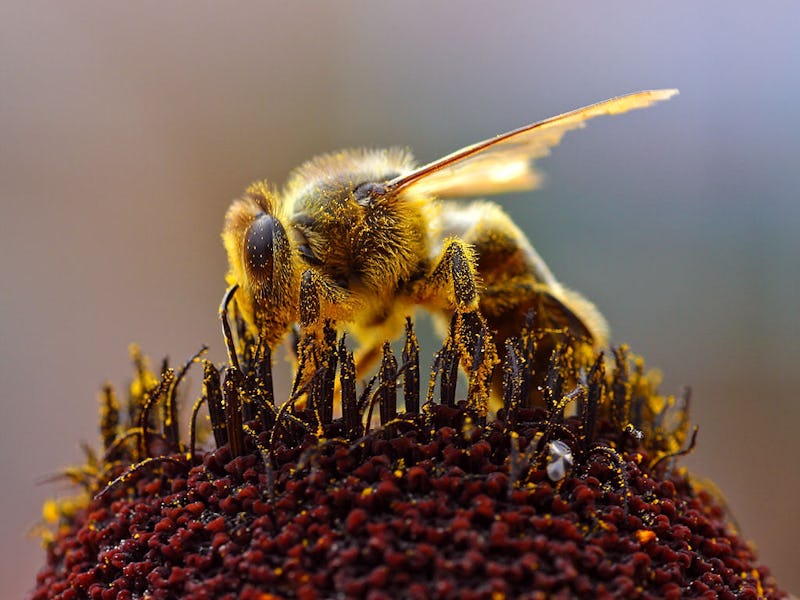Puerto Rico's 'Gentle Killer Bees' Could Prevent the Bee Apocalypse
This new breed of bees is exactly what farmers need.

Through a series of events that seem more like the plot of a Marvel movie than real life, the world’s only colony of gentle killer honey bees, a hybrid of African and European strains, turned the island of Puerto Rico into their home. It all started in 1958, when a group of ragtag African killer bees escaped from an experimental breeding program in Brazil, traveled by ship, and eventually made it to the Caribbean territory in 1994. These very aggressive bees displaced most of the gentle European bees already living there, but eventually the population evened out into colonies of docile but hardy bees.
On Wednesday, the scientists behind a new article in Nature Communications explained how this mixed-trait bee population came to exist, noting that their findings offer hope to the global beekeeping community, which has witnessed the disquieting decimation of European honey bees around the world.
In their study of the bees’ genomes, the team of international scientists found that the “Africanized” bees of Puerto Rico are a result of rapid evolution. Within 30 years of the African bees coming to Puerto Rico, a new population emerged — one that retained genetic traits of the African bees but shared the DNA of European bees. These bees, which dominate the island today, are believed to primarily be a product of “positive selection.”
An Africanized honey bee.
The most likely scenario, they write, was that when the African killer bees arrived on the densely populated island, humans, refusing to live with such scary bees, eradicated the most aggressive individuals in the population. The African bees that survived the cull were the most docile of the group, and as these gentler individuals bred with the European bees, a genetically different new colony emerged.
To come to this conclusion, the scientists sequenced the genomes of 30 “killer” Africanized bees, 30 “gentle” European honey bees (captured in Illinois), and 30 mixed-trait Puerto Rican bees. Comparing the genomes of these populations, they discovered that the Puerto Rican bees most resembled the African ones, but specific regions of the Puerto Rican bee genome resembled that of the European bees.
“Evolution involves changes in the frequency of gene variants across a population, and that’s what we’re seeing in Puerto Rico,” co-author Gene Robinson, Ph.D., explained in a statement.
“Now we know that these gentle Africanized bees can be genetically distinguished from both other Africanized honey bees and from European honey bees.”
A European honey bee.
These gentle Puerto Rican bees, which were first identified in 2012, may play an important role in the ongoing bee crisis because they are genetically distinct from known populations. As such, they’re less susceptible to the parasites and pathogens that have decimated European honey bees, which have low genetic diversity, and can continue the crucial agricultural process of pollination as those populations continue to decline.
In general, populations that lack genetic diversity are more vulnerable to threats — without a variety of genes to offer protection, the whole population becomes susceptible to the same pathogens. Traditional bee populations, in particular, are threatened by specific parasites and pathogens.
African bees, however, have managed to maintain their numbers because they share a gene that makes them highly resistant to varroa mite — a parasite that undermines the health of bees and spreads diseases.
While pesticides are believed to be a major reason honey bees have died around the world, varroa mites are thought to be a contributing factor as well. Because Puerto Rican bees are genetically different than European bees but still have their gentle demeanor, they could serve as a useful alternative for humans whose crops rely on varroa-resistant bees.
“Genetically diverse gentle honeybees could help secure agricultural production by providing pollinators more resistant to threats such as parasites and diseases,” the scientists write.
The need for strong pollinators is a huge one: Animal pollination drives five to eight percent of global agricultural production, and with bees in massive decline, much of the world’s crops are at risk.
If you liked this article, check out this video about reinventing beekeeping with flow hive.